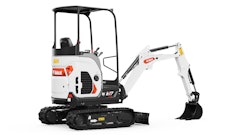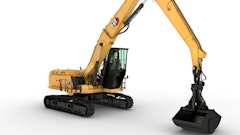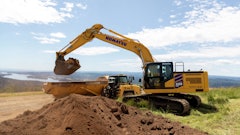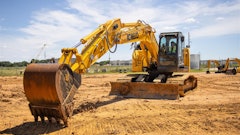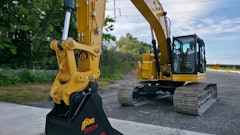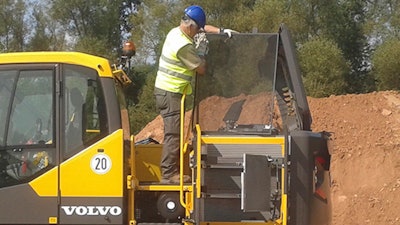
For those of you working in colder climates, it may seem that winter will never end — but the snow will stop falling eventually and temperatures will rise. When that happens, it’s time to get your excavator in gear for upcoming jobs.
I’ve been in the construction industry for 43 years, including over a quarter century with a Volvo Construction Equipment dealer in Alaska, so I know machines and I know the cold. Inspecting your equipment and getting it ready for spring will help you set the tone for a great year.
With that in mind, here are eight spring startup tips for your excavators:
- Fluids, filters and grease: Check the levels of hydraulic oil, engine oil and coolants, fill accordingly, and replace all filters. Grease major points thoroughly.
 Check the levels of hydraulic oil, engine oil and coolants, fill accordingly, and replace all filters prior to the start of the spring season.Volvo Construction Equipment
Check the levels of hydraulic oil, engine oil and coolants, fill accordingly, and replace all filters prior to the start of the spring season.Volvo Construction Equipment - Seals: Look for weeping or damaged seals and replace as needed. Note that black rubber (Nitrol) O-rings shrink in the cold, but after being cleaned and warmed up, they may reseal. So, make sure they’re actually damaged before replacing them or calling in someone like me for something that’s not a problem.
- Undercarriage: Clean the undercarriage free of debris and adjust the tension. Check for loose track pads and repair as needed.
- Boom and arm: Look for excessive pin and bushing wear, as well as any damage to hard lines and hoses. If there are signs of excessive “play,” replace the pins and bushings. Do not wait; that could lead to an extensive repair job that causes significant downtime during the season. Also, shim the boom, arm and bucket to eliminate side play.
- Engine: Inspect all belts to ensure they are properly tightened. Replace any that are cracked or otherwise damaged. Also check the integrity of all hoses, looking for signs of wear, cracking, swelling or damage from chaffing. Replace as needed. Assess the engine for oil and coolant leaks and address immediately. These are signs of what could become much bigger issues later if ignored.
- Battery: Even if you removed the battery at the end of the season, inspect the terminals and posts, cleaning as necessary. Check the electrolyte levels and the specific gravity and top off the charge.
- Interior and exterior: Thoroughly clean the cab and replace cab air filters. This helps protect the machine’s electronics and makes the space more comfortable for you. I’ve pulled cab air filters out of a machine that are nasty — and that’s the air the operator is breathing. Remove snow with a broom or blow it off with compressed air. When possible, move the machine into a warm storage facility to thaw any ice. Check that there is no ice around the swing mechanism, motor or transmission, as it can tear seals, leading to damage and downtime.
- Additional functions: Be sure to check that the lights, wipers, heater and air conditioning are all in working order, addressing repairs as needed.
Preparing for Even Higher Temps
Summer can be hard on equipment, too, so here are a few additional uptime tips for when the temperatures keep climbing. Fill the fuel and DEF tanks at the end of each day to minimize the risk of water ingress into the fuel system.Volvo Construction Equipment
Fill the fuel and DEF tanks at the end of each day to minimize the risk of water ingress into the fuel system.Volvo Construction Equipment
- Run your AC properly. One of the biggest issues we see in the summer is operators running the AC and having the doors or windows open at the same time. If you do that, all you're doing is putting unnecessary load on the AC component.
- Fill the fuel and DEF tanks at the end of each day. If you're down to the last quarter or so in the tanks, that fluid is extremely hot because of the return cycles. Hot fuel/fluid draws moist air through the breathers into the tanks, and even small amounts of water mixed in with your diesel will cause performance issues and maintenance hassles.
- Manage your greasing intervals during hot spells. Most OEMs have outlined greasing intervals in the operator manuals. It’s very important to follow these guidelines, especially if you’re in an extremely dusty or hot application where your grease may thin out faster or be exposed to more contaminants.
- Give machines more time to cool down. The most important component — and the reason for a normal condition, two-minute idle time before shutting off the key — is the turbocharger. Turbochargers are lubricated with engine oil and rotate at extremely high rpms. If not allowed to idle down, turbocharger shafts and bearings can be damaged.
Dealer and OEM Experts Can Help
You may choose to conduct machine inspections yourself or have a member of your team oversee the job. There is also the option to have a technician from a dealer or equipment manufacturer inspect the excavator. You could benefit from the expertise this technician has with the brands of excavators you run and with the experience they have from servicing machines from multiple customers. They could also look at fault codes; and if it’s a Volvo machine, they can download a MATRIS (Machine Tracking Information System) report. This report provides an in-depth look at operator behavior and operation data throughout the life of the excavator.
Whatever approach you take, it’s critical to perform thorough inspections to reduce the risk of downtime and costly repairs as you enter the spring season.
Garland Morrison is field technical support specialist, Volvo Construction Equipment.


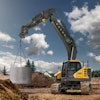

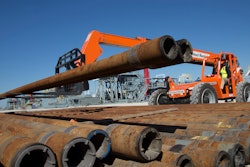

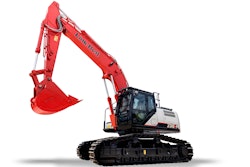




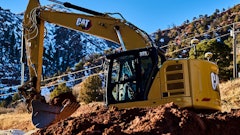
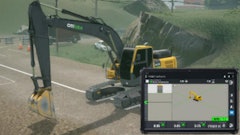
![Hcm Ax Landcros Dual Branded Logo[25]](https://img.forconstructionpros.com/mindful/acbm/workspaces/default/uploads/2025/11/hcmaxlandcros-dual-branded-logo25.Qhg3vUCjoK.jpg?ar=16%3A9&auto=format%2Ccompress&bg=fff&fill-color=fff&fit=fill&h=135&q=70&w=240)
